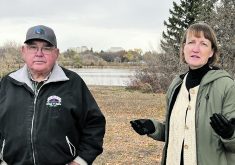The Saskatchewan Party candidate continues to travel the riding in campaign mode, despite his apparent lock on victory
ASSINIBOIA, Sask. — The campaign trail is a friendly one for Saskatchewan agriculture minister David Marit.
His rural constituents in Wood River typically vote for the Saskatchewan Party, voted overwhelmingly for him as a first-time candidate in 2016 and are expected to do so again on Oct. 26.
Marit grew up in the region, and with his wife Lois raised a son and a daughter here.
The former grain farmer and president of the Saskatchewan Association of Rural Municipalities speaks their language.
“He could probably go on a holiday for a month during the campaign and still win,” said Aneroid, Sask., cattle producer Bob Switzer during a campaign stop.
Read Also

Farming Smarter receives financial boost from Alberta government for potato research
Farming Smarter near Lethbridge got a boost to its research equipment, thanks to the Alberta government’s increase in funding for research associations.
But Marit is out meeting with voters, including farmers and business owners, in physically distanced settings during the pandemic to make sure he understands their issues and solidify their support.
Much of the talk centres on business risk management programs.
He highlights three subjects he expects to be raised at the November meeting of federal-provincial-territorial agriculture ministers: what to do about the reference margin limit in AgriStability, possible AgriInsurance changes, and the lack of temporary foreign workers, particularly in Ontario and Quebec.
Marit said removing the reference margin limit “solves a lot of our problems” but causes another.
“If we make any changes at all it really costs the province a lot of money,” he warned farmers gathered in Garth Dorgan’s shop at Meyronne.
However, he believes the federal-provincial BRM programs should be more flexible to accommodate different situations.
Cherilyn Jolly-Nagel, a constituent from Mossbank and Western Canadian Wheat Growers Association director, said there are challenges in trying to develop programs that work for everyone.
“What’s meaningful in Ontario we might find ridiculous,” she said.
Marit is concerned that the federal government would like to eliminate crop insurance, which he sees as key within the BRM programs.
Both Jolly-Nagel and Derek Tallon, a former member of the province’s youth advisory council for agriculture who farms at Lafleche, said crop insurance needs improvements.
Jolly-Nagel said her family has grown chickpeas for more than 10 years, perhaps as long as 20, and Saskatchewan Crop Insurance Corp. still considers it a new crop.
Farmers participate because banks require it but she said the banks don’t understand the program.
“It’s changing all the time and nobody can keep up,” she said.
Tallon suggested that those who grow canola on the same field year after year should not get full coverage.
“They’re insuring a poor practice,” he said, noting that chickpea coverage requires rotation so canola should as well.
Marit assured him that SCIC is watching who is growing what and where.
Pesticide use, single-use plastics in agriculture, water storage, rural broadband, western separation, trade and other issues were all raised during a day of meetings.
At the Ellert farm just west of Assiniboia, Bob Ellert said Marit is known for listening and being accessible, and with 76 percent of the vote last time will do just as well again.
Marit garnered 6,125 votes, compared to the NDP candidate at 991, the Progressive Conservative candidate at 554, the Green Party candidate with 200 and the Liberal candidate, 191.
His competitors this time around are Roger Morgan, a well-known teacher from Kincaid, for the NDP, and Wood Mountain Lakota First Nation member Kimberly Soo Goodtrack, an artist and teacher, for the Green Party. Nominations closed Oct. 10, after Western Producer deadlines.
Ellert said rural Saskatchewan supports the Sask. Party because it changed the attitude when it came to power in 2007.
“There is a future,” he said. “There are business opportunities in agriculture. They worked hard at expanding the industry and promoting business, not discouraging it. We do see things happening in rural Saskatchewan that went missing for quite a few years.”
Brody Loverin, who farms near Meyronne, agreed.
“What haven’t they done?” he said, but pinpoints the attitude more than anything.
He said younger farmers believe they can succeed because the government believes in them and has provided infrastructure to help them do business.
He said Morgan was his teacher, and he can get on board with the NDP promise to better support education but that would be all.
“I think they’ve done a really good job,” added Preston Dorgan. “They’re pro-business.”
Both said the provincial government has to do everything it can to eliminate the carbon tax. Dorgan said the world is not getting away from using oil for a long time.
“I’m not against initiatives to help the environment but the carbon tax is not the right way to do that,” added Loverin.


















